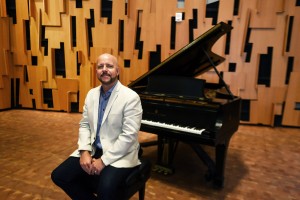James Bass flicks his baton to cue musicians when he performs with a choir. But in rehearsal he emerges as a teacher, his choir room becoming his classroom and his vocalists his students.
Bass, the new director of choral studies in the UCLA Herb Alpert School of Music, has made his career in classical voice performance while also educating young vocalists. A three-time Grammy nominated singer and conductor, Bass is also a bass member and the chorus master for the Miami-based choir Seraphic Fire.
The Daily Bruin’s Ishita Gambhir spoke with Bass about his beginnings in music, his experience conducting professional and amateur choirs around the world and his plans for the department of choral studies at UCLA.
[Related: Students petition to maintain choral programs at UCLA]
Daily Bruin: How and when did you get involved with conducting work?
James Bass: As with most musicians that make their career out in music, you start relatively early. I started playing violin and double bass in middle school and high school. … While at the Interlochen Center for the Arts, a Michigan-based arts training program, I got involved with the choir and found out that many people just said that I had a nice voice, so I ended up pursuing voice for the rest of my life.
DB: Did you always want to teach?
JB: With conducting, it doesn’t matter if it’s professional musicians or amateur musicians, you’re still a teacher ultimately. … You’re teaching (vocalists) either your interpretation or your particular style to make music and to learn music. And so by proxy, if you want to be a conductor, you have to be a teacher.
DB: Do you find that there is a difference between university choirs and professional choirs?
JB: The biggest difference is the amount of time it takes to learn music. The emotion, the personalities, the idiosyncrasies are the same. Good singing is good singing.
When I’m working with the professionals, I’m informed by knowing that there are people back at the university that are training to take their positions, and having the knowledge that there is a generation behind us ready to go is very important, especially in classical music. We need to know that we have the hearts and the minds that are willing to go on and make this music.

[Read more: Director talks UCLA production of comedy piece based on medieval poetry]
DB: Considering that you have been all around the country, do you think that there’s a difference between the music scenes in Los Angeles, Miami and Michigan?
JB: Miami is a portal for South and Central America, and so many different ideas and cultures about music are coming through there. Of course, LA is a little bit of that, and the portal coming in from the Pacific Rim. Cities like Miami and Los Angeles tend to have vibrant music scenes.
Michigan was a wonderful music scene too … but LA allows you the opportunity to make classical music that also intersects with the movies, television, stage performance (and) Hollywood Bowl. And that’s the thing I’m most excited about.
DB: What changes do you have in mind for the next year as the new director of choral studies?
JB: There has been a rise in the United States in the last 15 to 20 years in professional vocal ensemble singing. … I’d like UCLA to become the new center of professional choral ensemble singing, being that as a young singer or conductor knows that if they come to UCLA, they’re gonna get that type of training, so that they can go in the market and work with groups like the Chanticleer in San Francisco or Conspirare in Austin, Texas or Polyphony in New York. … UCLA has not had that visibility in the past, they’ve not really been geared that way, so I’d like that number one.
And number two … I want these conductors to know that UCLA is going to be a place that you’ll receive podium time, meaning that you’re on the podium conducting your ensembles. This is not a degree that is only theoretical – it’s applied.
We want to provide concerts, we’re going to provide concerts to the LA area, but I want UCLA to be the major program in the (University of California) system to come be a professional singer and conductor.
